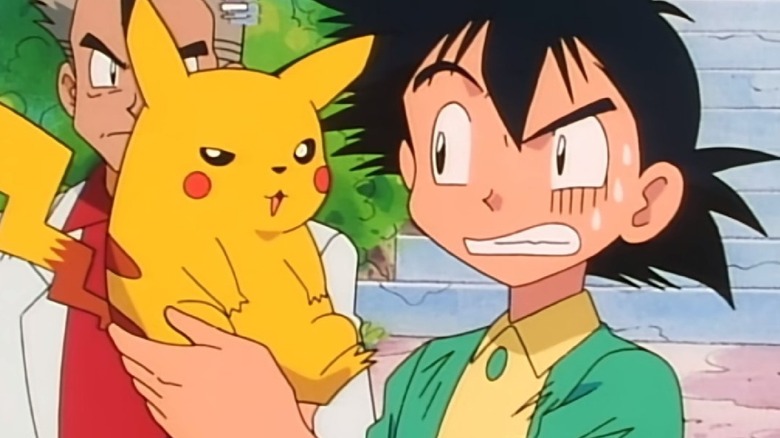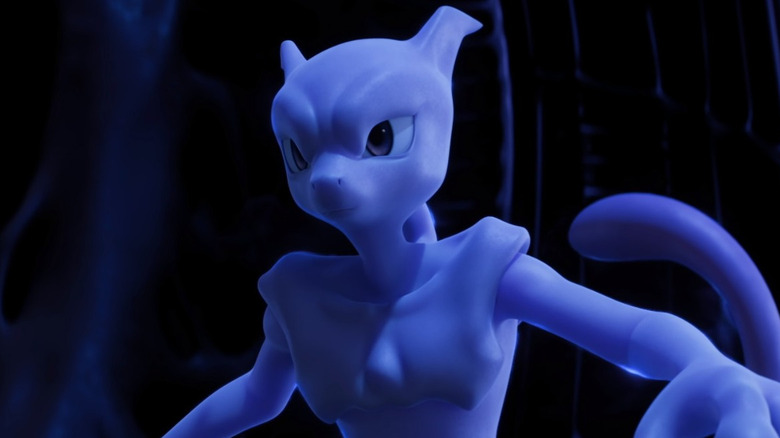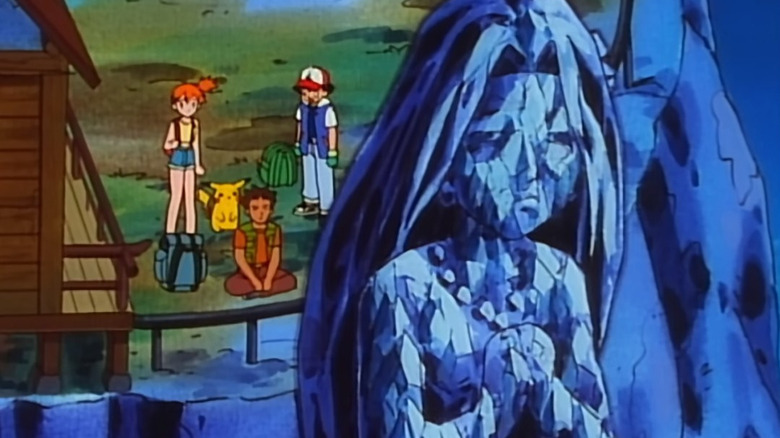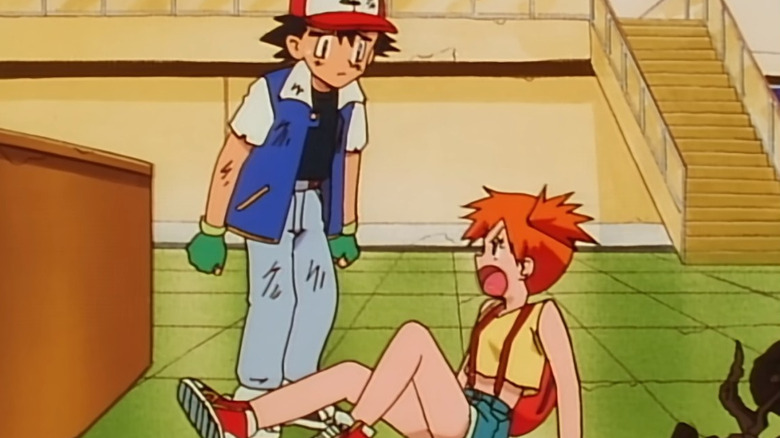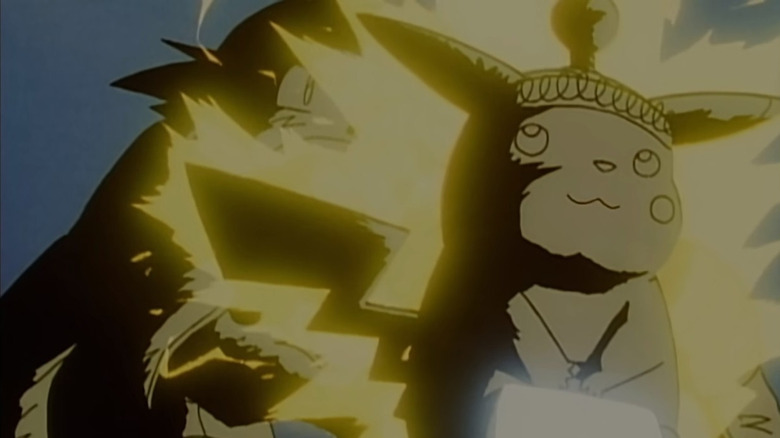Is Pikachu Satanic? 5 Ways A Preacher 'Proved' Pokémon's Darkest Theory
You've heard of "Pokémon," right? Of course you have. Whether you've played one of the games, seen an episode of the long-running TV show, bought a booster pack of trading cards, or even just seen memes on social media, the 25-plus-year-old series centered around collecting cute, magical creatures has become nothing short of a beloved staple of pop culture. There's just one problem — "Pokémon" is an instrument of hell.
Or, at least, that was the surprisingly common sentiment among certain religious groups back when "Pokémon" was first hitting the scene. Against the backdrop of the Satanic panic of the 1990s, the all-ages-friendly monster-catching franchise suffered the same fate as other pop culture phenomena like "Harry Potter," as devout collectives decried it as immoral and evil. Arguably the most notable example is Texas preacher Phil Arms, who even went so far as to write and publish an entire book on the topic. However, Arms isn't the only preacher who has garnered notoriety for his distrust of all things "Pokémon."
Over the past few years, a certain video has gone viral which features an unknown male preacher from The Prophecy Club giving a lengthy sermon to a crowd of followers regarding all the demonic elements of "Pokémon" hidden throughout the video games, the trading card game, and the anime. Suffice to say, the man has some...interesting points of evidence. Catch 'em all here.
Pokémon designs are satanic
If there's one thing that the preacher from the viral anti-"Pokémon" video seems completely convinced of, it's that some of the most iconic 'Mons from the original set of 151 have demonic features in their designs. At one point, the man draws his followers' attention to an image of the adorable series mascot Pikachu. "His tail. It's a lightning bolt. And it is as satanic as he," he says, with no further explanation. For reference, he's potentially speaking about the symbol of the satanic "S," which resembles a lightning bolt, but that can't be completely verified.
At another point in the video, the preacher focuses his attention on Mewtwo, the man-made psychic creature who stars as the main antagonist of "Pokémon: The First Movie." Pointing out the monster's pose in which it holds out one of its three-fingered paws, he approximates the hand-horn gesture (commonly associated with rock 'n' roll culture) before declaring: "It means, 'Hail Satan.'" Later, the preacher points out that Mewtwo's hand out pose is always done with its left hand, all while showing an image of the creature holding out its right hand.
As egregious as the two aforementioned examples of demonic Pokémon designs are, the best has been saved for last. Referencing the spiral shape on Poliwhirl's belly, the preacher asks the crowd if they know what it stands for, takes a beat, and then simply answers: "Male fertility." Some depictions of fertility deities in different cultures do include spirals, but it's probably not a shock to hear that the chances of Poliwhirl being designed with this concept in mind are decidedly slim.
Wizards of the Coast is an evil...trading card publisher
Here's a bit of a Poké-history lesson: the trading card publisher who produces the "Pokémon Trading Card Game" of today is not the same company who originally managed the property. While the TCG has, perhaps unsurprisingly, been managed in-house by The Pokémon Company for the past 20-or-so years, it actually had a different publisher for its first four years of life in the U.S. market: a little company called Wizards of the Coast, which also happens to be the longtime publisher of "Magic: The Gathering."
According to The Prophecy Club's Pokémon-centric sermon, the fact that Wizards of the Coast published the TCG should be a major cause for alarm. After all, a wizard, going by the preacher's definition, is a "male practitioner of black magic." Whether or not he means to imply that Wizards of the Coast employs real wizards to manufacture trading cards is unclear.
On the topic of the TCG, the preacher also has quite a bit to say about the various elemental energy cards that are common to the game. Per his explanation, the Psychic-type energy card symbol is an "all-seeing eye," the Fighting-type energy card symbol is a representation of anarchy, and the Fire, Grass, and Water-type energy card symbols apparently symbolize earth, wind, and fire — the three elements of witchcraft. No, he doesn't explain how he derives wind from water.
Catching 'em all leaves no time for piety
If you thought there was any part of the "Pokémon" brand that was safe from this preacher's wrath at this point, you're sorely mistaken. Even the franchise's original tagline of "Gotta catch 'em all," which refers to the act of catching and befriending every Pokémon out there (a frankly gargantuan task with the 1000+ creatures as of the release of 2022's "Pokémon Scarlet and Violet"), supposedly encourages a harmful ideology.
According to the preacher, the concept of catching Pokémon, bonding with them, and becoming a Pokémon Master, is sinful because those connections will supposedly replace a child's need for family, education, and religion. "Gotta catch 'em all," he explains. "You don't need Mom, you don't need Dad, you don't need grandparents, you don't need aunts and uncles, you don't need school, and you probably don't even need a church. Because you're a master."
Unfortunately, there's no way of knowing the preacher's opinion on pets.
Immorality abounds in the anime's cast
While iconic "Pokémon" protagonist Ash Ketchum has finally become a Pokémon Master and has since concluded his decades-long journey in the anime, both he and the supporting cast of the original series have already made their mark as some of the most popular fictional characters in entertainment. Unfortunately, the preacher has a bone to pick with a couple of them for their immoral lifestyle and fashion choices.
In the seminar, the man singles out Ash's companion Misty — a short-tempered yet capable trainer of Water-type Pokémon — as a poor female role model for not abiding by traditional values. He critiques her clothing, particularly her halter top and short shorts, before describing her personality. "She's headstrong and stubborn, constantly arguing with Ash. Typical woman," he says, eliciting laughs from the crowd before chuckling "God forgive me."
The longtime comedic villain duo of Team Rocket members Jessie and James are similarly pointed out by the preacher for ostensibly promoting negative values. He notes that the pair often engage in schemes to steal Pokémon that require them to use disguises, and they frequently crossdress in the show. The pair do, indeed, crossdress from time to time, though how massive of an issue that may be is up to the perception of the individual viewer.
Pokémon gave children seizures
This last point is an exceptionally interesting one because there is at least a dimension of truth to the claim. As the preacher notes in the video, there was once an incident in which over 600 Japanese children experienced epileptic seizures after viewing a certain episode of the "Pokémon" anime. The problem is that what the man says after noting this fact is far less accurate: "There's something unusual about that. They don't know why it happened."
In truth, the reason for the children suffering seizures is quite well-known and established. The episode which caused the incident, 1997's "Electric Soldier Porygon," includes sequences with bright flashing lights that rapidly alternate in color, thereby triggering adverse symptoms in epilepsy-sensitive individuals. The episode was banned in Japan after its first and only airing due to the incident, the anime took a months-long hiatus afterward, and the episode never even saw a release in the U.S. or any other international territory.
In essence, "Pokémon" didn't give children seizures because of the devil, but due to an incredibly unfortunate animation mishap. It seems some of the dark truths of "Pokémon" aren't that sensational after all.
